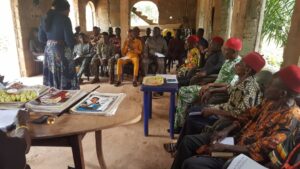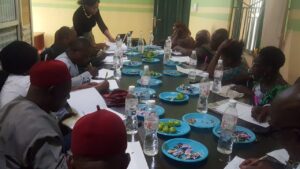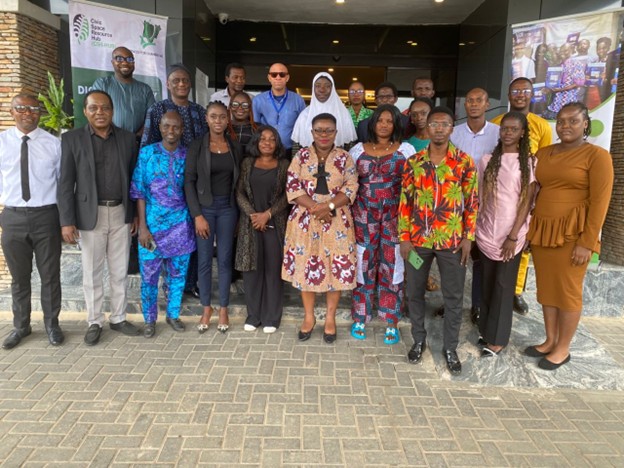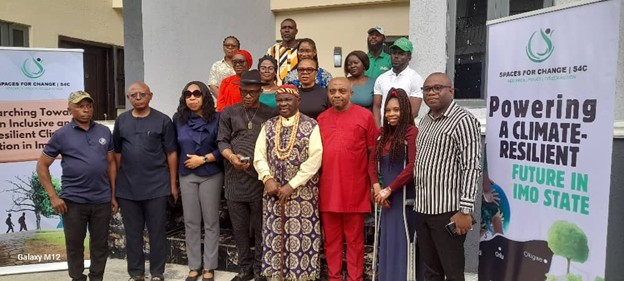With support from the Ford Foundation, Spaces for Change’s | S4C’s empowerment campaign train to strengthen the ability of communities endowed with natural resources to protect their environment and negotiate better deals with corporations and investors berthed in Imo and Ebonyi States on July 26 and 28 respectively. Recently, S4C launched the COMMUNITY-INVESTOR GUIDELINES (CIG) developed to support host communities to engage meaningfully throughout the lifecycle of an extractive project, from discovery and exploration, to planning, construction, operations, and closure. Armed with the CIG, S4C convened sensitization workshops in the two states which brought together traditional rulers, local chiefs, women, youth and community leaders of Assa and Ilile communities in Ohaji /Egbema Local Government Area (LGA) of Imo State (hosting oil and gas mineral desposits) and Ameka mining community in Ezza South LGA of Ebonyi State known for its huge lead and zinc mineral deposits.
The CIG was developed in response to the gaps in the stakeholder engagement practices between communities and corporations documented in S4C’s previous research publication ‘Natural Resources and Benefit Sharing Negotiations Between Host Communities and Extractive Companies; A Case Study of Assa North Ohaji South Gas Development Project”. That report detailed issues like information and power asymmetry between communities and investors, community-investor negotiations not meeting the standards of Free, Prior, and Informed Consent (FPIC), ignorance of host communities about negotiation and land acquisition processes, lack of legal representation and low compliance with Environmental Impact Assessment, (EIA) reports, among the top drivers of the hostilities between extractive corporations and their host communities in Nigeria. T0 fill these gaps and address the vast power asymmetry between the negotiating parties, the CIG Guidelines were developed to provide communities with the much-needed legal empowerment and information about the duties and obligations of the investors as well as the rights that they have regarding a range of issues, including land acquisition, compensation, and the ability to say “no” to any new project. The CIG Guidelines focused on community empowerment because locals bear the brunt of the health, environmental and social effects of extractive activities.
Facilitating the training in their local languages, S4C’s facilitators led by Ms. Chetachi Louis-Udeh and Jecinta Mbamara, walked participants through the applicable legal frameworks that undergird effective negotiations between investors and their host communities such as the Petroleum Industry Act 2021, Environmental Impact Assessment Act, National Environmental Regulation, amongst others. Consultations to obtain the consent of indigenous communities should commence prior to the exploration of subsurface resources. At this stage, the community has the opportunity to ask questions, present their needs and priorities, negotiate better compensation terms and even have the power/right to say ‘No’ to an extractive project in their community. Participants also learned about the duties and obligations of investors in extractive projects including compensation for land use and environmental damage; information disclosure;; undertaking due diligence to mitigate negative impacts; incorporation of Host Community Development Trusts; adherence to local content rules/job quota for communities; award of scholarships, entrepreneurship, empowerment schemes, and technical training; development of effective complaint mechanisms; engaging civil society; adherence to all environmental and health regulations etc.
Participants also learned about their rights as resource-rich communities to lay claim to accruable benefits from the resources mined from their backyards. Other specific rights include the right to compensation, the right to legal representation, the right to expert land valuation, protection from forced displacement, the right to receive contributions from the investors for host community development, etc. One point that strongly resonated with everyone is that investors are not doing the communities any favor by consulting and negotiating with them. Rather, meaningful consultation and engagement is not only a binding legal obligation on all investors, but also a precondition for the grant or revocation of operating licenses. Elated participants could not hold back their excitement at the end of the sessions, and thanked S4C for equipping them with the knowledge that can increase their bargaining power at the negotiation table with investors. See below some of the reactions from the participants:
- The Community-Investor Guidelines is a child born in due season and very easy to understand.
- The meeting has increased our knowledge on the rights of the host community, including the right to benefit from natural resources.
- Armed with the Community-Investor Guidelines, we would return to our community to claim and assert our right to a safe environment.
- The meeting helped us to know that women should be included during consultation and negotiation as the project affects them more.
- Investors are not doing us a favor as a community by mining mineral resources in our communities and we have a right to say NO.
- The meeting was informative and should be held often. We hope that S4C will always be available to offer both legal and technical support whenever called on by host communities.





